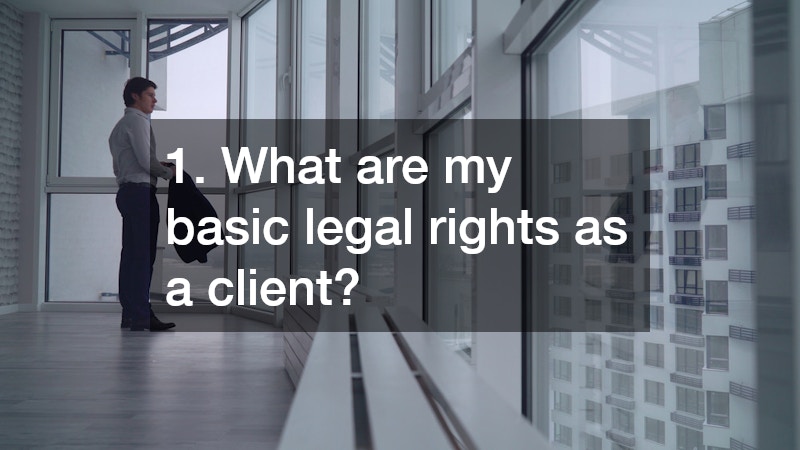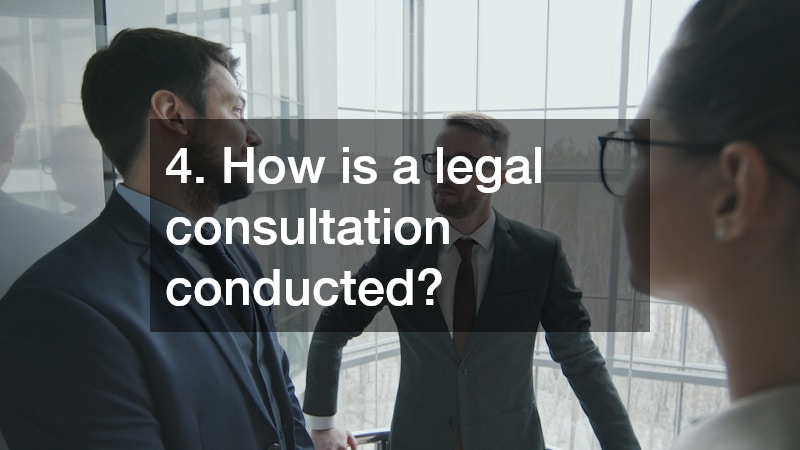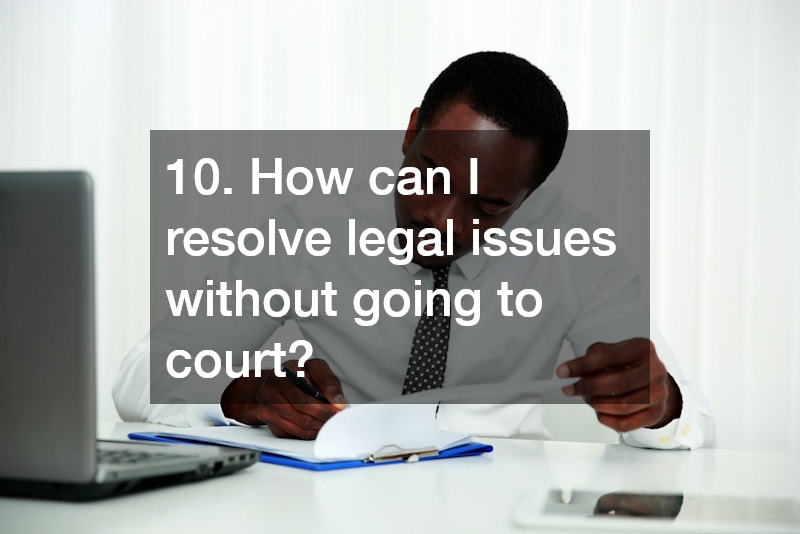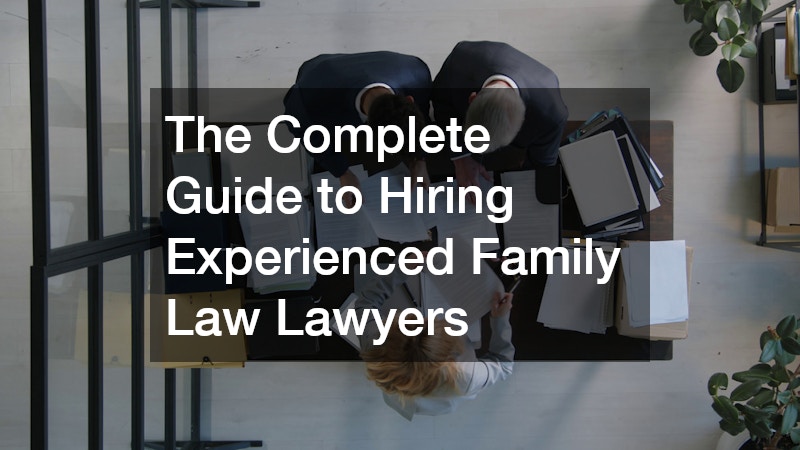Understanding Your Legal Rights A Guide for Clients
Navigating the legal landscape can be daunting for many. This guide aims to provide you with a comprehensive understanding of your legal rights as a client. Having this knowledge not only empowers you but also aids in effectively managing legal matters that may arise. Knowing your rights helps in minimizing potential risks and making informed decisions, especially when dealing with various legal professionals such as divorce attorneys or a personal injury lawyer. Whether you’re involved in contracting, litigation, or even intellectual property issues, being well-informed is your first step to a successful legal journey. The information presented will guide you through different aspects of law, giving attention to specifics like bankruptcy lawyers, the role of immigration law, and how to handle criminal law services. Equip yourself with practical insights and ensure your dealings with the legal system are as smooth as possible.
1. What are my basic legal rights as a client?

As a client, it’s crucial to understand your basic legal rights, particularly when engaging divorce attorneys. One of the fundamental rights is the right to informed consent, which means your lawyer must keep you updated about your case’s progress and seek your approval before making any significant decisions. This transparency ensures that you are an active participant in your legal matters.
Another vital right is the right to effective communication. This ensures that you have regular and meaningful interactions with your personal injury lawyer or any legal representative you choose. Clients should expect to receive explanations of complex legal jargon, discussions about available options, and updates throughout the process.
Finally, clients have the right to confidentiality. Any information shared with your divorce attorneys, including personal details and case specifics, must be kept private. This confidentiality fosters trust and allows you to be forthright with information that might be critical to your case.
2. How do I choose the right lawyer for my case?
Selecting the right legal representative, such as a personal injury lawyer, starts with assessing your specific needs. Consider the type of case you have and the expertise required—whether you need assistance with estate planning, divorce, or another specialism. Researching the lawyer’s experience in the relevant field can significantly impact the outcome of your case.
It is essential to conduct thorough interviews with potential lawyers. During these interviews, discuss their approach to similar cases and ask for references from past clients. This will help give you a clearer picture of their capabilities and how well they might represent your interests.
Lastly, consider the lawyer’s communication style and fee structure. A good lawyer will communicate openly and frequently, so ensure their style matches your expectations. Regarding fees, understand their billing arrangement, whether they charge hourly rates or work on a contingency basis, which is often the case with a personal injury lawyer.
3. What is attorney-client privilege?
Attorney-client privilege is a pivotal aspect of receiving legal advice, such as divorce legal advice, ensuring that communications between you and your lawyer remain confidential. This privilege means that any information you share with your lawyer cannot be disclosed to third parties without your consent. It is designed to encourage open and honest communication, as your lawyer must know all relevant facts to provide the best advice.
There are exceptions to this privilege, such as when a client intends to commit a crime or fraud. In such cases, the protection is waived to prevent harm. Understanding these exceptions is crucial, especially when dealing with sensitive matters or potential criminal law services.
Utilizing attorney-client privilege effectively also requires that you, as a client, maintain confidentiality on your end. Sharing privileged information with third parties, however, may compromise the protection offered by this privilege, so exercising discretion is advised.
4. How is a legal consultation conducted?

A legal consultation is your first point of contact with a criminal lawyer, where you discuss the details of your case and determine the best course of action. Typically, these consultations provide an opportunity to assess the lawyer’s expertise and their proposed strategy. During this meeting, you can clarify any immediate concerns and determine if the lawyer is suited to handle your case.
The attorney will likely ask pertinent questions to gather relevant information that might affect the case’s strategy. Prepare by bringing any documents or evidence related to your situation to make the consultation more productive. Transparency during this stage is crucial in receiving accurate advice and effective representation.
Legal consultations often cover the attorney’s fees and billing practices. Discussing these upfront with your criminal lawyer can prevent misunderstandings later. Different practices for charging fees, ranging from flat rates to contingency fees, should be clearly outlined and understood.
5. What are the common types of legal fees and billing arrangements?
Understanding the types of legal fees and billing arrangements is vital, especially when dealing with specialized areas like those handled by bankruptcy lawyers. The most common billing arrangement is the hourly rate, where the lawyer charges a set amount per hour of work. This method is typically employed in complex cases, where the time needed is difficult to predict from the outset.
Some lawyers, particularly in personal injury cases, may opt for a contingency fee arrangement. Here, the lawyer is paid a percentage of the settlement if the case is successful, ensuring that the client only pays legal fees if they win. This can make pursuing a legal case more accessible for clients without upfront financial burdens.
Additionally, flat fees may be used for routine services such as drafting simple wills or handling straightforward divorces. Understanding the nature of your case and discussing these options with your lawyer will help in deciding the best fee arrangement for your particular situation. It’s crucial to be clear on this aspect to avoid potential disputes or misunderstandings down the line.
6. What should I know about contracts and agreements?
Contracts are the foundation of many business and personal relationships and understanding their dynamics is crucial for anyone dealing with immigration law or similar fields. A well-drafted contract is legally binding and outlines the rights and obligations of each party involved. It helps in preventing misunderstandings and disputes by clearly specifying terms.
When entering a contract, it’s crucial to read and fully understand all terms before signing. Many clients overlook minute details, later leading to unfavorable situations. Consulting with a lawyer for a contract review can provide insights into potential pitfalls or areas requiring clarification.
In certain instances, disputes may arise, requiring mediation or litigation. Clarity in contracts, supported by legal advice from experts in relevant fields like immigration law, can mitigate these issues. Hydrualic representation can provide a strong defense in instances requiring legal intervention.
7. How do I protect my intellectual property?

Intellectual property protection is crucial for businesses and individuals who wish to safeguard their creations or innovations. Criminal law services often intersect with intellectual property law when dealing with infringements. To protect your intellectual property, consider registering patents, trademarks, or copyrights as applicable.
Understanding the scope and limits of these protections is crucial to avoid unauthorized use or claims in court. However, registration is only the first step; active monitoring and enforcement of your intellectual property rights is necessary to prevent infringements.
Consulting with a legal professional who specializes in intellectual property law can provide valuable guidance. They can help navigate complex legal systems to ensure your rights are fully enforced and violations are addressed quickly and effectively. Protecting your intellectual property allows you to capitalize on your creations without fear of unauthorized usage.
8. What is involved in litigation?
Litigation is the process of taking legal action in court and often involves disagreement over issues such as contracts, estate planning, or divorce. A divorce lawyer, for instance, would handle litigation related to property division, spousal support, and other marital disputes. This complex process is governed by procedural rules and requires in-depth legal knowledge to navigate effectively.
Typically, the litigation process involves multiple stages: investigation, pleadings, discovery, pre-trial, trial, and possibly an appeal. Each stage demands extensive preparation and strategic planning. Engaging a competent lawyer is essential, as they will represent your interests and guide you through each phase.
The outcome of litigation depends on the strength of the evidence, the effectiveness of your lawyer’s arguments, and adherence to legal standards. Thus, retaining the services of experienced legal professionals, such as a dedicated divorce lawyer for family matters, can significantly impact the success of your case and ensure your rights are upheld.
9. What are my rights during a criminal investigation?
During a criminal investigation, understanding your rights is absolutely paramount, as the decisions you make early on can have long-lasting consequences. Regardless of the circumstances, you are entitled to protections under the law designed to prevent unfair treatment and ensure due process. One of the most critical rights is the right to remain silent. By exercising this right, you avoid inadvertently providing information that could be misinterpreted or used against you in court. It is important to remember that anything you say, even in casual conversation, can potentially be scrutinized, which makes cautious communication essential.
Equally important is your right to legal representation. Having criminal lawyers present during interrogations, questioning, or searches ensures that your rights are upheld and that you are not subjected to undue pressure or coercion. Lawyers experienced in criminal law services understand the nuances of legal procedure and can provide guidance on what to say, what to avoid, and how to protect your interests throughout the investigation. They can also negotiate with law enforcement or prosecutors when appropriate, helping to mitigate potential consequences.
Additionally, you are protected against unreasonable searches and seizures under the Fourth Amendment. This means that any evidence obtained unlawfully can often be challenged and potentially excluded from court proceedings. A skilled criminal lawyer can assess whether law enforcement followed proper legal protocols and can file motions to protect your rights. Being informed about these protections, staying calm, and exercising your rights at every stage of a criminal investigation can significantly influence the outcome, safeguarding both your freedom and your future.
10. How can I resolve legal issues without going to court?

Resolving legal issues without resorting to court proceedings is often more efficient and less stressful, providing parties with greater control over the outcome and timeline. Mediation and arbitration are increasingly popular alternatives to traditional litigation, offering a less adversarial approach. This can be particularly beneficial in sensitive cases, such as those involving a rape attorney, where privacy, emotional well-being, and the potential for a collaborative resolution are key considerations. Both methods focus on negotiation and compromise, facilitated by the expertise of an impartial third party who guides the process while ensuring fairness.
Mediation encourages open communication between the parties, allowing them to discuss their concerns, priorities, and potential solutions in a structured environment overseen by a neutral mediator. This approach fosters collaboration rather than confrontation, often resulting in creative solutions that might not be available through the courts. By emphasizing mutual understanding and compromise, mediation can help preserve relationships and minimize the emotional toll that often accompanies protracted legal battles, while also significantly reducing legal costs.
Arbitration, while slightly more formal, involves an arbitrator who evaluates evidence and arguments before issuing a binding decision. It is generally faster and more private than litigation, helping parties avoid lengthy court delays and public exposure. Both mediation and arbitration can save significant time and resources while providing a resolution that meets the needs of all involved. Consulting with legal professionals experienced in these alternative dispute resolution methods is crucial, as they can provide guidance on which approach best suits the specifics of your case and ensure that your interests are fully represented throughout the process.
This guide has aimed to provide a comprehensive overview of your legal rights as a client, covering a range of topics from choosing the right lawyer to understanding complex legal processes such as litigation and alternative dispute resolution. By equipping yourself with this knowledge, you are well-positioned to minimize legal risks and make informed decisions.
The importance of selecting the right legal representative, being informed about attorney-client privileges, and understanding the intricacies of contracts cannot be understated. Whether your legal needs involve the expertise of bankruptcy lawyers, an immigration law specialist, or a skilled rape attorney, staying informed is your surest path to success. We hope this guide serves as an invaluable resource in your legal endeavors.




Post Comment